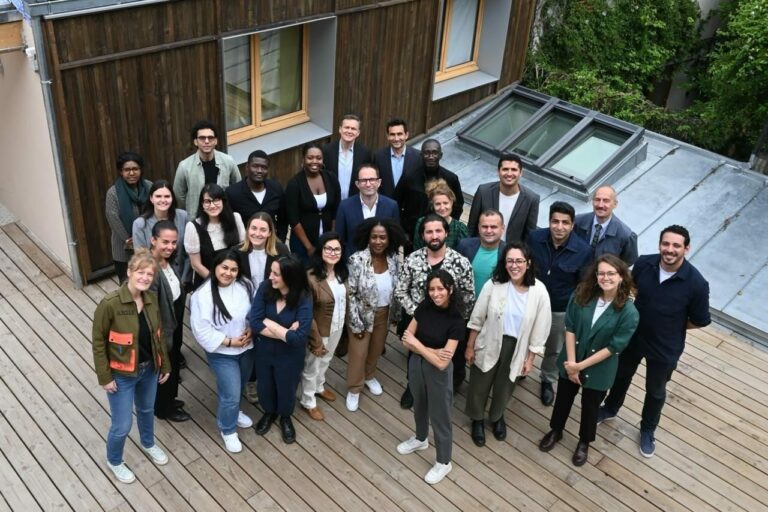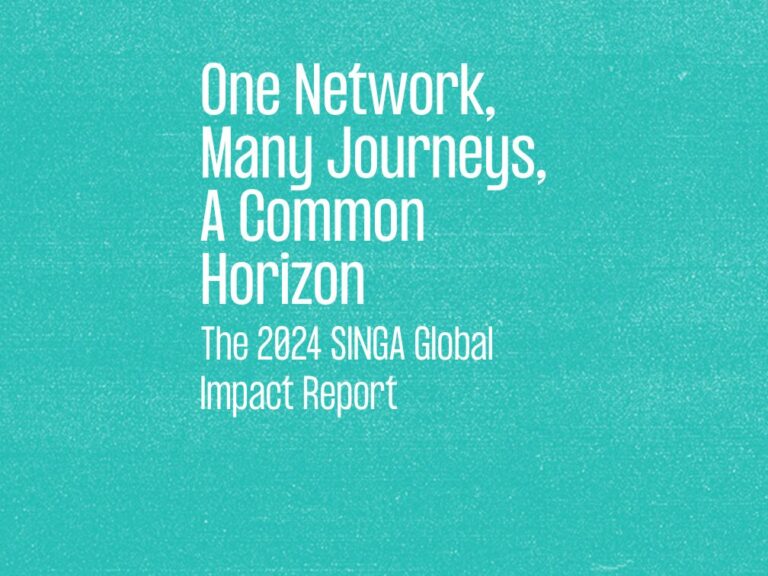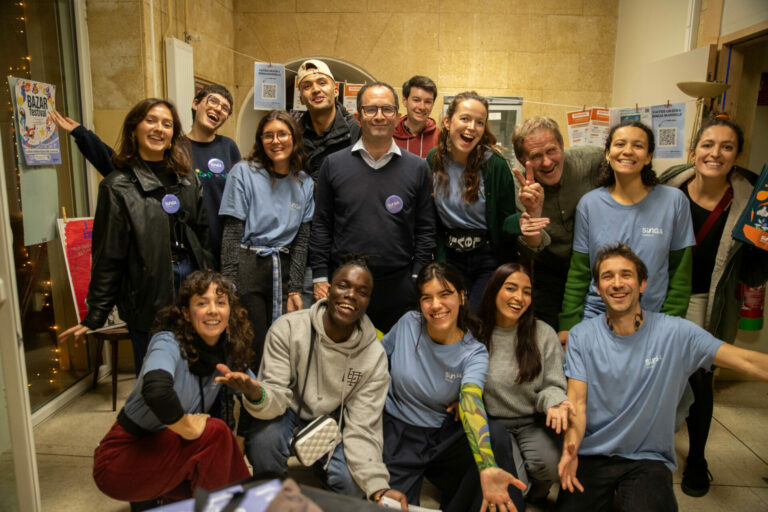- About
- SINGA in the world
- Entrepreneurship
- Intercultural encounters
- Training and information

On June 20th, for World Refugee Day, the Voix en Exil program, led by CFI in partnership with SINGA, the Maison des Journalistes and Reporters Without Borders (RSF), announced the launch of its second cohort. This program sheds light on a reality that is still little known: that of journalists forced to flee their countries and rebuild their careers in exile, from France.
While the UN Refugee Agency (UNHCR) estimates that over 130 million people were forcibly displaced in the world in 2024, including several thousand journalists, Voix en Exil offers them a framework to continue their mission — freely and safely.
Protecting freedom of information: a major democratic issue
Journalism is the oxygen of democracy — that is why independent media are often targeted and forced into exile in other parts of the world, notably to France. The role of these refugee journalists is crucial in ensuring access to reliable, independent, and diverse information.
In exile, these professionals continue to address their fellow citizens who remain in their home countries, as well as diasporas and international audiences. In a global context of increasing media repression and declining press freedom, their work fuels democratic debate, documents human rights violations, and helps fight misinformation.
Protecting them and enabling them to continue working are essential conditions for the right to information.
“SINGA is here to reveal the expertise and skills of these journalists — which didn’t vanish at the border. Highlighting their know-how is essential — both for their personal lives and fulfillment, and for the enrichment of our societies. Press freedom is fundamental and fragile, including here in France. This program helps keep it alive by supporting its plurality” said Benoît Hamon, Executive Director of SINGA Global, during the program launch.
Voix en Exil: a program supporting refugee journalists
Supported by the French Ministry of Europe and Foreign Affairs, the Voix en Exil program helps refugee journalists rebuild their professional paths in France, as they face major challenges such as isolation, precariousness, administrative hurdles, and language barriers.
This flagship program offers them reception and socio-administrative support, strengthens their skills through training and mentoring, and showcases their work through visibility efforts and networking with French media — helping them overcome the double uprooting of both geography and profession.
Since its launch in September 2024, Voix en Exil has supported a first cohort of 17 journalists from 10 countries, including Afghanistan, Syria, Russia, Iran, Haiti, and Guinea — countries where the press freedom situation is ranked “difficult” or “very serious” by the RSF 2025 index.
“The Voix en Exil program helped me amplify the voice of Afghan journalists in exile and gave me vital support to continue my mission of independent journalism despite immense challenges. The workshops and trainings were incredibly helpful. It connected me with a global network committed to press freedom and human rights,” said Noorwali KHPALWAK, Afghan journalist.
14 new voices join the 2nd cohort of the program
Forced to flee their countries due to political pressure, conflict, or repression, these journalists carry with them a valuable richness: diverse perspectives on the world, deeply rooted in firsthand experience and resistance against erasure.
Here are the 14 journalists joining the second cohort, each with a unique and courageous journey:
- Mohamed Abdelkawy (Egypt): Egyptian freelance journalist and producer, working with outlets such as AJ+, Al Jazeera, and Al-Araby Al-Jadeed. Specialized in “new media”, he covers human rights and political prisoners in Egypt, as well as Arab and French topics in France.
- Anoosha Ansari (Afghanistan): Afghan journalist with ten years of experience, having worked in Kabul and Mazar-i-Sharif for Ariana TV. She fled Afghanistan after the fall of Kabul and arrived in France in 2022. With a background in finance and business, she is now studying at Lyon 2 University.
- Ferdinand Mensah Ayité (Togo): Togolese journalist, founder and editor-in-chief of investigative newspaper L’Alternative. In December 2021, he was arrested and jailed for his investigations into corruption. After a brief release, he fled Togo before being sentenced in absentia to three years in prison and targeted by an international arrest warrant. In 2023, he received the CPJ International Press Freedom Award. In 2024, he graduated with a Master’s from ESJ Paris.
- Khaled Khalaf (Syria): Syrian journalist from Idlib, journalism graduate from the University of Damascus (2009). He has covered Syria’s political and social upheavals since 2011. Now based in France, he is working on a documentary about exile with the association Carmen.
- Ali Mahfoud (Libya): Libyan journalist and researcher based in France, specializing in migration, asylum, and cybersecurity, as well as EU-MENA geopolitics. He is also co-founder of the Mediterranean Student Dialogue (MED), supporting young journalists in the region.
- Naline Malla (Syria – Kurdish): Kurdish-Syrian journalist and researcher with over 14 years of experience, specializing in fighting disinformation and humanitarian intervention. She is currently pursuing a Master’s in comparative research in anthropology, history, and sociology at EHESS.
- Mariam Mana (Afghanistan): Afghan journalist who worked with Internews, 8am Daily, IRIB, and collaborated with the BBC. She arrived in France in 2017 and is developing a platform focused on women’s rights and environmental protection.
- Basma Nasser (Yemen): Yemeni journalist and filmmaker living in France, collaborating with Making Waves, a production company focused on social impact.
- Djenyka Piverger (Haiti): Haitian journalist with extensive radio experience, developing programming on social issues in Haiti, especially gender-based violence.
- Rodly Saintiné (Haiti): Haitian radio journalist and host, RFI correspondent since 2018. He founded a multimedia journalism school in Haiti and, after fleeing in 2021, arrived in France in 2023. He is currently working on a podcast about exile.
- Simon Suleymani (Turkey – Kurdish): Kurdish journalist with solid experience in media and communication. Imprisoned for 16 months in Turkey due to his journalistic work, he has lived in Paris as a political refugee for four years. He is president of the Association of Kurdish Filmmakers in Paris and coordinator of the Zagros Film Festival.
- Sharifullah Shagiwal (Afghanistan): Afghan journalist who worked for Tolo News and Shamshad TV. After the fall of Kabul, he fled the Taliban regime and arrived in France in 2023. He is currently working on anti-human trafficking issues in Afghanistan.
- Amanullah Qaisari (Afghanistan): Prominent Afghan sports presenter, worked nearly ten years for Moby Group. After Kabul fell in 2021, he fled Afghanistan to France with the support of RSF and the Ministry of Foreign Affairs. He is creating a trustworthy platform for sports news, particularly women’s sports in Afghanistan.
World Refugee Day, a key moment for these exiled journalists
“World Refugee Day honors the courage of those who flee war or persecution and reminds us of the importance of solidarity and humanity toward displaced people” says Halima Karimi, Afghan journalist supported in the first Voix en Exil cohort.
This World Day is an opportunity to highlight the importance of hosting these journalists, so that they can find safety in secure countries, continue their mission of informing, and contribute their expertise to host societies. It must also draw attention to the many administrative challenges these refugees have faced during their journeys — and often still face once in France.
The Voix en Exil program fully integrates this reality to ensure that journalists can continue to work freely and in the best possible conditions.
📌 To read the program updates and meet the journalists: lien



Latest news

Measuring inclusion without reducing it: SINGA publishes its first impact report

Entrepreneurship with SINGA in 2026: applications are now open throughout France
